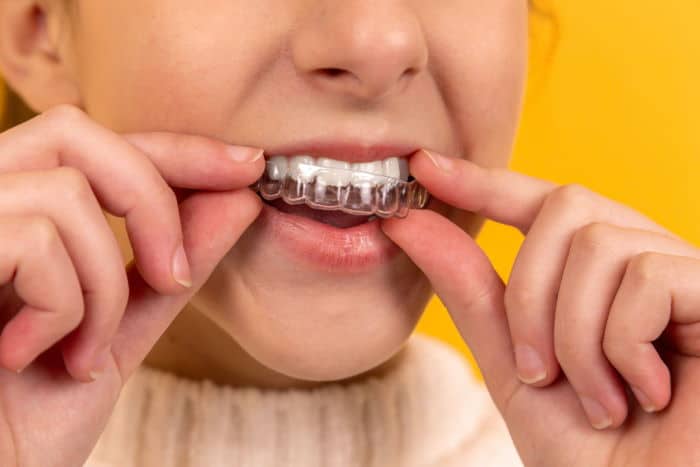TMJ Treatment Options If You’re Diagnosed with TMJ Disorder
Patients diagnosed with TMJ exhibit symptoms that range from mild to severe. If you are diagnosed with this condition, you might be curious about the best TMJ treatment options to offer relief from these symptoms. The National Institute of Health Brochure on TMJ suggests using the most conservative treatment approach whenever necessary. Therefore, it pays to know your treatment options so you can decide the best way to remedy your symptoms.
TMJ Treatment Options
As the research institutions continue to gather information about the cause of TMJ disorder, there are various treatment options available for anyone suffering from this condition. Take time to learn about each of the treatment options and seek the opinion of a TMJ expert to guide you when making treatment decisions.
- Lifestyle Modifications
There are a growing number of patients affected by TMJ symptoms. Most of these symptoms go away without any treatment while others don’t. However, you can try a few home and lifestyle remedies to alleviate the symptoms and make them less painful or bothersome.
Stress is often associated with TMJ symptoms. Therefore, engaging in stress-relieving activities such as exercise and meditation can also provide relief to TMJ symptoms. Maintaining a healthy oral routine is also a good way to combat this disorder. Make sure you regularly pay your dentist a visit to address any TMJ-related symptoms.
Other lifestyle modifications that you can adapt to treat TMJ include switching to a soft food diet, not chewing gum, or not opening your mouth too wide when yawning. You must also perform regular jaw exercises to strengthen your jaw joints. If you are experiencing pain in the jaw area, you can use an ice pack or a heat pad for pain relief.

- Medications
Certain medications are prescribed for patients with TMJ disorder. The short-term use of over-the-counter pain medications is approved to provide relief from jaw and muscle discomfort. If the pain persists, your doctor can prescribe a stronger dose or anti-inflammatory medications. No drugs or medications are currently labeled as being made primarily for TMJ use. Therefore, these medications are only used to manage the symptoms of TMJ disorder, not to treat the disorder.
It’s important to work closely with your TMJ doctor to analyze the effects of certain medications. Keep an eye on possible drug interactions.
- Injections
Aside from medications, injections are also offered to patients with TMJ disorder to provide temporary relief from symptoms. It is a minimally invasive treatment with no recovery time needed. The actual injection can be done in less than 30 minutes.
Corticosteroid injections reduce inflammation in the joints and muscles affecting your TMJ condition. Botox is one of the most common examples of injections known to alleviate the symptoms of TMJ.
- Bite Correction
If you have tried any of the above treatments and your TMJ symptoms persist, your TMJ doctor might recommend undergoing a bite correction method. Wearing a bite guard is a common example of a bite correction method. However, it only works for moderate symptoms of TMJ.
The mouth guard is made of a hard plastic or pliable material that repositions and stabilizes the jaw. Wearing the mouth guard eases pressure on your jaw joints and muscles to reduce the symptoms of TMJ. This type of treatment is recommended for those patients who are prone to clenching or teeth grinding.
While there are generic mouthguards for sale online, it is important to choose one that is doctor-recommended to ensure quality and effectiveness.

- Arthroscopy and Arthrocentesis
If the above TMJ treatment options prove unsuccessful, your TMJ doctor will suggest progressing to more advanced treatments.
An orthopedic surgeon performs arthroscopy to diagnose a TMJ condition. This procedure involves inserting a fiber-optic camera into the jaw joint to determine the exact cause of the TMJ symptom. On the other hand, arthrocentesis uses the same procedure but it is intended for diagnosis and treatment. Instead of a fiber-optic camera, the process involves a needle and a syringe that drains the fluid from the joint. The physician will analyze the fluid and determine the cause of the joint swelling.
The above procedures are recommended to get a better understanding of the cause of TMJ symptoms. The diagnosis will inform you of the correct treatment method to use for symptom relief.
- Surgery
TMJ surgery is the last resort for treating TMJ symptoms. The surgical process involves repairing, repositioning, and removing some parts of your TMJ to address the issue. The procedure requires the longest recovery time from the treatment options available. Patients who undergo jaw surgery will be put under general anesthesia.
Arthroplasty is an open joint procedure that is typically performed on TMJ patients. In this procedure, a surgeon makes an incision along the joint of the ear to gain access to the joint. This procedure requires patients to undergo general anesthesia. The entire procedure lasts two to three hours on average. Patients are expected to recover in three to eight weeks.
For TMJ pain caused by severe jaw abnormalities, they will recommend a procedure known as orthognathic surgery. This procedure corrects various bite issues like underbite, overbite, open bite, or uneven bite. Orthognathic surgery is a complex procedure performed in a hospital setting. Incisions are made on the inside of the mouth to insert screws and plates that secure the bones. Depending on the condition of the jaw joint, the surgeon will manipulate the upper or lower jaw, or apply an expansion device to promote bone growth.
Various risks are involved when performing TMJ surgery, such as scarring, loss of jaw movement, and the possibility of your body rejecting the artificial joint. Severe pain is expected immediately following the procedure. After a few days, the pain will subside and your doctor will prescribe anti-pain medications. Hence, many TMJ specialists recommend using the least invasive treatment before moving on to this process.
If your doctor recommends a surgical treatment for your TMJ, it’s best to seek a second opinion.
